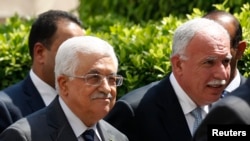Arab League foreign ministers have met in extraordinary session to hear Palestinian Authority President Mahmoud Abbas discuss developments in the Palestinian territories and Israeli-annexed East Jerusalem.
Saturday's meeting followed weeks of unrest in the holy city, which has spread across the occupied West Bank and Arab communities in Israel.
Abbas briefed Arab foreign ministers in Cairo about the impasse in peace negotiations with Israel and to urge U.N. Security Council approval of an Arab plan for creation of a Palestinian state.
Secretary-General Nabil Elaraby reminded the foreign ministers that the Arab League presented a similar proposal two years ago.
The Arab states agreed in November 2012 to use international bodies such as the U.N. to create a Palestinian state, he said, and all parties agreed to a timetable for ending Israel's occupation of Palestinian territory.
Abbas blasted Israel for a number of unilateral measures it has taken, and he warned that Palestinians will not negotiate with Israel if it continues establishing new Jewish settlements on Arab land in Jerusalem and the West Bank.
Abbas has asked Israeli Prime Minister Benjamin Netanyahu on numerous occasions to stop building settlements and to respect the internationally recognized 1967 border separating Israeli and Arab territories.
Multiple obstacles prevent the Palestinians from entering into negotiations with Israel, Abbas said, especially unilarteral actions such as the Israeli Cabinet's action this month to officially define Israel as a nation-state of the Jewish people and affirm the country's essential Jewish character. Abbas said the Palestinians recognized Israel as a sovereign nation more than two decades ago, in the landmark 1993 Oslo Accords, but have never and will never recognize it as a Jewish state.
Officially declaring Israel is a Jewish state, along with other measures the Netanyahu government is considering, amounts to “apartheid,” Abbas said.
He cited restrictions that bar Palestinians from using certain roads in the West Bank, a move that implies Palestinians are second-class citizens. He also condemned a requirement that anyone elected to the Israeli parliament, or Knesset, must swear loyalty to the Israeli state.
Abbas said U.N. recognition of a Palestinian state will enable his government to appear before the International Criminal Court and other recognized bodies. He said he is planning to demand U.N. protection for the Palestinian people following this year's war between Israel and forms of Hamas in the Gaza Strip.
Arab League discussions centered on timing of the move for Palestinian statehood, and for a hypothetical Israeli withdrawal from the territories it occupies. The Palestinian president admitted he has agreed in the past to requests from U.S. President Barack Obama and Secretary of State John Kerry to postpone any unilateral declaration of Palestinian statehood. But now, he said, his patience has run out.
Sweden said last month it will recognize a Palestinian state, and the French and British parliaments both discussed the same course. French Foreign Minister Laurent Fabius has indicated that France will wait two years before taking such direct action.








